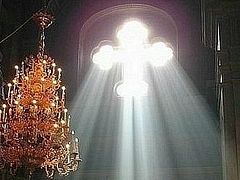There is much advice to the faithful on how to pray and worship during these times when, in many places, churches are closed to the faithful, even if services are being held; and in many churches, there are not even services behind the locked doors. Let us pray that God will shorten the days that the pestilence is upon us.
As we know, the first Christians prayed and worshipped in their homes; indeed, the Last Supper of Christ, which instituted the Eucharist, was held in a house as the Gospels tell us. A church was established in the house of Aquila and Priscilla (1 Cor. 16:19). “Greet the brethren in Laodicea, and Nymphas, and the church which is in her house”, says Apostle Paul (Col. 4:15). In Acts 16:14-15, we read that St Paul stayed in the house of Lydia, and no doubt services were held there. Paraphrasing St Paul, St John Chrysostom says, “make thine house a church” (Homily XLIII on 1 Corinthians). It is possible, then, to make one’s house “a house of prayer”. Naturally, lay people cannot serve the Divine Liturgy in their homes, but they can do other services, and pray. They can also watch the services which are transmitted or streamed. What is needful is to pray and watch with the right inner disposition. In the Life of St Matrona of Moscow, we read this:
“Once, on a feast day, Matrona’s mother invited her husband to join her for the service as usual. But he did not go. He decided to pray and sing at home. Matrona stayed with him, too. Throughout the service Natalia was thinking about her husband and felt sorry that he hadn’t come with her. When Natalia was back home after the Liturgy, Matrona said: “You haven’t been to church, Mother.” Natalia was surprised: “Don’t you know I am just back and taking off my coat?” “Father was in church, but you were not.” Matrona saw that even though her mother attended the service her heart was not praying.”
Many churches around the world, especially in Russia, broadcast services—where they are still permitted, of course—on television and the internet. This is nothing new, at least, as far as television is concerned. For many years, in countries such as Greece, those who for whatever reason—old age, infirmity, and so forth—could not go to church watched the Divine Services on television.
Is this all right? Some dioceses do stream services (for example, Pskov) which they would hardly do if there was any doubt the faithful should view them. How should people in their homes react to the “streaming” of church services? It should be said at once that no one should relax in his armchair and watch the television or computer and view such transmissions as a television programme. But where going to church is not possible, let the faithful respond in an appropriate manner to these broadcasts. Candles and lamps can be lit and incense can be burned. They can stand reverently whilst watching, just as they would in church; they can respond with making their cross and their bows and so forth at the usual moments; they can be attentive to the chants and the readings. And at the end, why not mingle some wine and water and take some antidoron if available or some specially prepared bread and pray that the Lord blesses them, and then partake of them? Will not the ever-merciful Lord accept these like the sacrifice of Abel? Will God make Himself distant from such faithful doing what they can in the circumstances in which they find themselves?
Surely this is better than simply imagining what it would be like to be in church. And I have heard of people who, before the epidemic started, watched the services on television, and felt grace. After all, the Holy Spirit, Who is “everywhere present and fillest all things” will surely not disdain the efforts made by those faithful who can do no other. Did not clergy in the Soviet camps make what effort they could, and surely what they did was acceptable to God? God is not limited by our predicament. “Behold, the LORD’S hand is not shortened that it cannot save; neither his ear heavy, that it cannot hear” (Isaiah 59:1).





